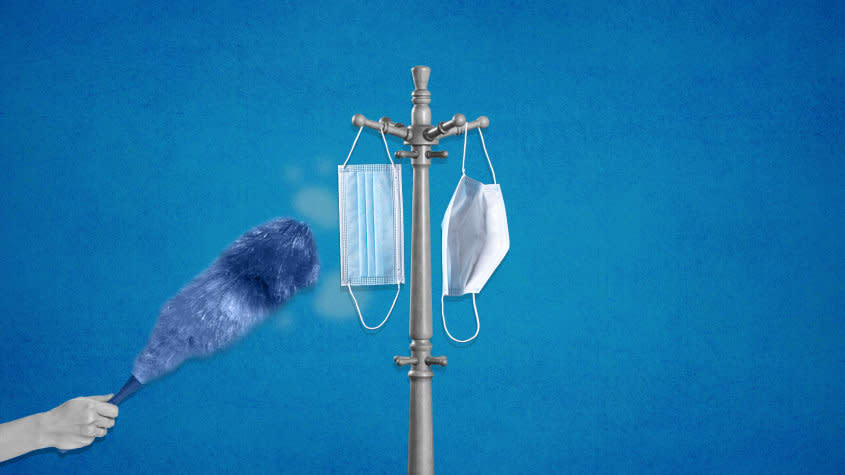Is it time to mask up again?

- Oops!Something went wrong.Please try again later.
- Oops!Something went wrong.Please try again later.
Are mask mandates making a comeback? A "growing number of experts" say it's time to pull those leftover N95 masks out of the junk drawer to protect against a rising tide of Covid-19 infections and hospitalizations, CNN reported. "If you're trying to be careful, it's time to whip out the mask again," said Dr. Robert Wachter of the University of San Francisco. The big question, the news network asked, is this: "Are Americans in the mood for masks?"
"Cities and states have widely dropped mask mandates as Covid rates have dropped," CBS News reported. But they're now returning in a few private settings. Deadline reported that Lionsgate, the movie studio, has brought back masking requirements for many of the employees at its flagship office in Santa Monica, California. The Press Democrat, up the coast in Santa Rosa, reported that Kaiser Permanente, the country's "largest primary care provider" has begun mandating masks for staff, patients and visitors at its facilities there. Similarly, Morris Brown College in Atlanta said this week it would require masks at "all classes and functions."
But masks are still divisive. The Hill reported that Rep. Marjorie Taylor Greene (R-Ga.) critiqued the college's decision. "Americans have had enough COVID hysteria. WE WILL NOT COMPLY!" she wrote online. Some observers are clearly hoping that masks don't again become a flashpoint. "We're hoping we won't see a situation where things are as dire as they were a couple of years ago," said one health official.
What the commentators said
The new mandates are "abject madness," Noah Rothman wrote at National Review. During the height of the pandemic emergency, masking became a "signifier of tribal identity and cultural tastes." Now? The reappearance of a few mandates smacks of a "public-relations campaign designed to convince America's institutional stewards to force a full-scale return to the bad old days." Mask mandates should be a "quaint artifact" of the emergency. Instead, it seems little has changed "among those who pine for the restrictions on social and economic life that pertained during the pandemic."
Don't panic. Even with the recent rise in cases, the "number of people severely ill from Covid is much lower than a year ago," Dr. Leana S. Wen wrote in The Washington Post. While "health officials must practice vigilance," it will be up to individuals to calculate their risks, including the risk of long Covid. For those folks, precautions will depend on "their specific circumstances and what activities they are willing to forgo."
One place where people should wear masks? Hospitals. The end of the formal Covid emergency means that several hospitals dropped their mandates, Abdullah Shihipar wrote for CNN. But masks "don't just help against Covid but against other respiratory illnesses," and hospital-acquired infections are pretty common. Masking up in medical settings is just good sense. "No one wants to go to the hospital and come away with a new illness."
What next?
According to Yahoo, officials are keeping their eyes on schools as classes get underway across the country, especially with the Eris variant becoming more widespread. "Some kids have had pretty significant illness with this," said one California physician. "On the other hand, some kids have mild coldlike symptoms. Parents just need to be aware that Covid-19 is still out there."
There's skepticism that widespread mask mandates will return, per ABC News. "I don't see that as something that we're likely going to be adopting," said Dr. Albert Ko at the Yale School of Public Health. Instead, public health officials say it's more likely they'll work to make sure the public is informed of the risks from rising cases and new variants.
"I think the new approach is we want to make that information available to the public and give people some warning that there may be some increases in disease activity," Marcus Plescia, the chief medical officer for the Association of State and Territorial Health Officials, told The Hill. "And then people decide for themselves sort of how they want to react and what kind of precautions they want to take."

